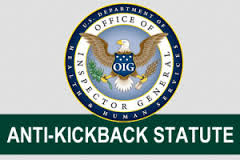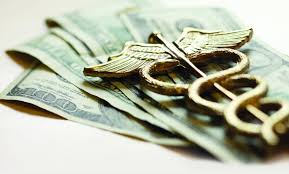Anti-Kickback Enforcement – Steady and Aggressive
 When commentators criticize the FCPA for its broad coverage of international business operations, these same commentators would have real trouble with the US Anti-Kickback statute. Talk about broad coverage and then complicate it with specific exemptions that are challenging to interpret and apply.
When commentators criticize the FCPA for its broad coverage of international business operations, these same commentators would have real trouble with the US Anti-Kickback statute. Talk about broad coverage and then complicate it with specific exemptions that are challenging to interpret and apply.
When it comes to fraud enforcement in the healthcare industry, the Justice Department wields a mighty stick – the False Claims Act. Companies cannot fight an enforcement action because they face a frightening death penalty equivalent – exclusion from participating in all federal health care plans. For every company, that is the sword of death.
With the enactment of the Affordable Care Act, DOJ prosecutors included every statutory change to the False Claims Act they could think of to benefit them in the fight against fraud. Congress was happy to give them everything they wanted, and the rest has been history. Included in the list of changes was the clarification that claims for services or items resulting from an AKS violation constitute a false or fraudulent claim under the False Claims Act.
The AKS statute prohibits remuneration to induce sales or referrals of products covered by federal health care programs. Whistleblowers and the government are pushing the AKS statute to the outer reaches of reasonable interpretations.
Last year, drug and device companies paid over $600 million in False Claims Act cases. About $500 million of the $600 million was generated from AKS cases.
Before the Olympus case was announced last week, the largest AKS case in the last years was against Novartis for $390 million for giving discounts and rebates to specialty pharmacies to increase sales. Novartis agreed topan extended Corporate Integrity Agreement and government oversight will continue for another 5 years.
The government also brought a major enforcement action against Warner Chilcott for $125 million for civil and criminal violations of the AKS and False Claims Act. In a classic AKS scenario, Warner Chilcott illegally paid kickbacks to doctors through speaker program, lavish meals, so-called educational events and other means to induce and incentivize doctors to prescribe its drugs.
The Warner Chilcott case was even more significant because the Justice Department secured an indictment against Carl Reichel, the former President of the company, for conspiracy to pay kickbacks. In a move akin to the 1980s prosecutions of Wall Street traders, the government arrested Reichel.
Healthcare companies are also major targets of AKS and False Claims Act enforcement. Millennium Health paid $256 million last October for unnecessary drug and genetic testing, as well as illegal kickbacks to physicians.
Last Fiscal Year, DaVita paid $350 million to resolve allegations of illegal kickbacks to physicians for referrals of patients for outpatient dialysis services.
 Just to make matters worse, Congress enacted in 2015 the Federal Civil Penalties Inflation Adjustment Act Improvements Act of 2015 which requires DOJ to adjust False Claims Act penalty levels for inflation – the amount of per false claim could nearly double depending on how the Act is implemented.
Just to make matters worse, Congress enacted in 2015 the Federal Civil Penalties Inflation Adjustment Act Improvements Act of 2015 which requires DOJ to adjust False Claims Act penalty levels for inflation – the amount of per false claim could nearly double depending on how the Act is implemented.
The Justice Department will increase its bargaining leverage with companies caught in a False Claims Act case. DOJ recoveries are likely to increase significantly because of these new per claim penalties and DOJ will take full advantage of this additional hammer in its arsenal.














